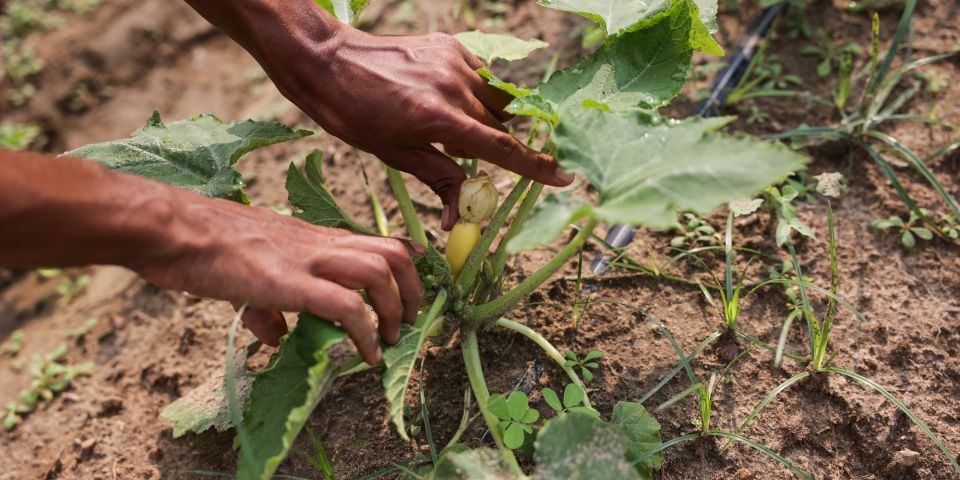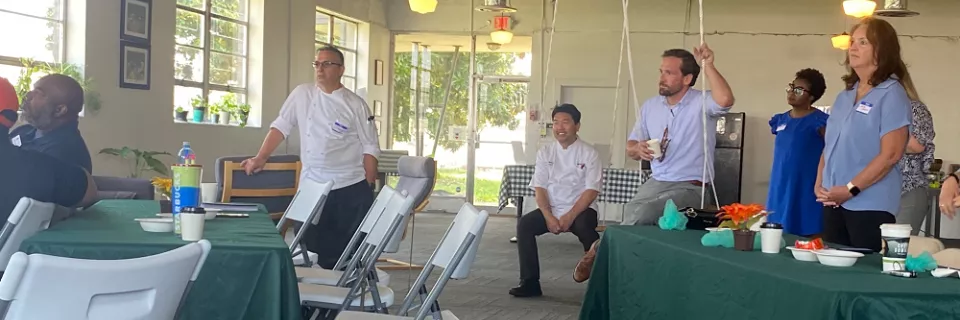Let's Connect
Our friendly and educated team is here to partner with you every step of the way. Connect today to learn of all the ways to partner with The Common Market.
Starlit Roots is a Black- and woman-owned organic vegetable farm located in Georgia ran by Tianna Rose Neal. Area institutions are stepping up to buy Neal's product in advance.
Delivering local food for the common good.

By Emily Hennessee
Forward commitments are a key component of our work to support values-based procurement practices within area institutions. But, what is a forward commitment and how do they benefit both farmers and institutional buyers? Read on to learn more!
What is a forward commitment?
Forward commitments are agreements made in advance with institutions, like universities and hospitals, to purchase products from values-aligned growers over an extended period of time, often a growing season or calendar year. Although this sounds like a relatively simple concept, forward commitments reflect a major paradigm shift compared to the standard model of institutional food purchasing, which includes placing orders week to week, providing little to no stability to farmers. By making forward commitments, institutional customers harness their purchasing power and become engaged, mission-aligned investors in our regional economy and our agricultural communities, rather than mere purchasers and consumers of products.
What are the primary benefits of forward commitments to farmers?
Farming is tough work and many variables are outside the control of farmers, especially as it relates to climate and weather impacts. Due to centuries of structural racism and discrimination, many farmers of color have experienced limited access to the land and capital necessary for wholesale production. As a result, these producers disproportionately lack access to the resources and consistent market opportunities that allow their operations to grow and remain viable.
Fortunately, forward commitments offer stability and predictability in an otherwise uncertain field. They enable farmers to buy inputs, create a crop plan, and plant knowing that an end customer is lined up to purchase their products once harvested. These institutional investments will increase the capacity of farmers and create a more robust, resilient, regional food system of family-owned farms, poised to supply fresh, local, sustainable food!

What are our farmers saying about forward commitments?
“It is important to know that us farmers are growing food to feed people right here in our community, and work to provide a product that you don’t have to get from California, or any other place,” Tianna Rose Neal, owner of Starlit Roots recently explained.
Starlit Roots is a Black- and woman-owned organic diversified vegetable farm located in Keysville, Georgia. They grow items like squash, cucumber, okra, watermelon, eggplant and other seasonal produce especially for some of our area institutions.
“I encourage new partners to stay committed to that ideal, of buying locally, and understand how much a forward commitment helps sustain the food system, and sustains natural resources. We don’t have to transport food from miles away when it is being grown and distributed right here—all local farmers need are the commitments and the resources to do so,” Tianna continued.
We don’t have to transport food from miles away when it is being grown and distributed right here—all local farmers need are the commitments and the resources to do so,” Tianna continued. — Tianna Rose Neal, owner of Starlit Roots
Which institutions are making forward commitments?
Throughout the Southeast, 18 institutions have made forward commitments in 2023. These institutions made forward commitments for a variety of reasons: to align with their sustainability, equity, and corporate responsibility goals, to establish consistency of product delivery, and to develop meaningful partnerships with local farmers. Aramark’s higher education sites have quickly become champions for forward commitments in the region.
The Common Market hosted Aramark chefs, general managers, district managers, and regional leaders at our Southeast warehouse in July 2023. During this day-long convening, Aramark representatives heard a first-hand account from a farmer about the power of forward commitments, shared lessons learned and procurement best practices between peers, and enjoyed a delicious meal highlighting some of the minority growers in The Common Market’s supply chain. Following this event, nine Aramark accounts made forward commitments to underrepresented growers for the 2023-2024 school year. These commitments align with Aramark’s environmental, social, and governance (ESG) platform, Be Well. Do Well. (BWDW).
“BWDW highlights Aramark’s commitment to sourcing ethically and inclusively while enabling the wellbeing of the communities we serve. Our goal to increase spend with small local farmers specifically, reflects our commitment to drive positive economic impact through responsible sourcing,” shared Katelyn Repash, Aramark’s Responsible Sourcing Procurement Director.
When asked why Aramark decided to pursue forward commitments with farmers within The Common Market network, Repash said, “Pursuing forward commitments is an essential component in how we approach sourcing and growth opportunities with small-scale farmers. Aramark seeks to support small and underrepresented farmers throughout our supply chain. When we commit to consistent purchasing volumes, the farmers know they will have a guaranteed market for their produce at the price they need, and our chefs know the product is going to arrive when they planned for it."

Forward commitments are a win-win – they benefit farmers and institutional customers! The Georgia ACRE Collective is eager to collaborate with other institutions looking to make forward commitments to growers in the region. If you are interested in learning more, please contact Emily Hennessee, The Georgia ACRE Collective Project Manager, at emily@thecommonmarket.org.
Our friendly and educated team is here to partner with you every step of the way. Connect today to learn of all the ways to partner with The Common Market.
"The Common Market has been wonderful to work with. Not only is the customer service great but the products are also."
— Derick Smith, Culinary / Culinary Purchaser, Cancer Treatment Centers of America